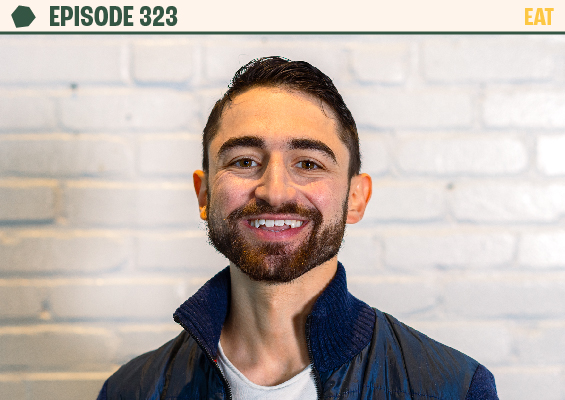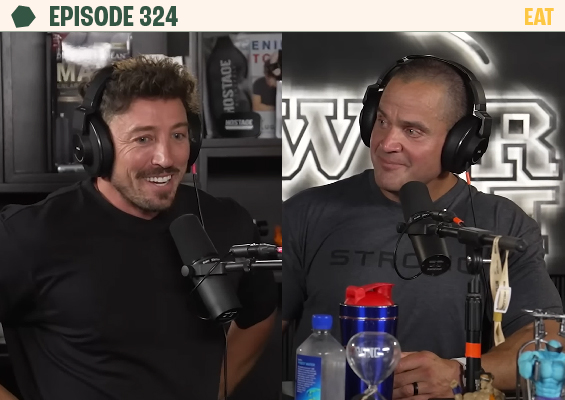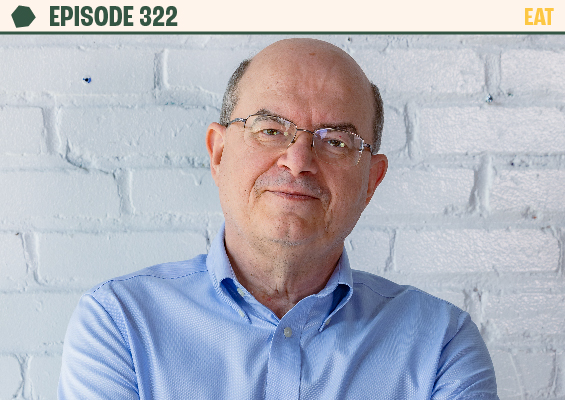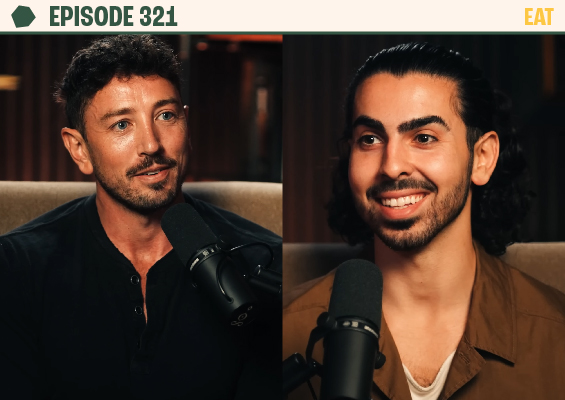Oreo cookies or statins – which is more effective in reducing LDL cholesterol? The results from one study might surprise you. Join me in Episode #323 as I sit down with Oxford PhD graduate and Harvard Medical student Dr Nick Norwitz to discuss the lipid energy model, what it has to do with Oreos, and how different diets affect your health.
Nick Norwitz, PhD is a 28-year-old 4th year medical student at Harvard Medical School. Prior to pursuing a career in medicine, he attended Dartmouth College where he majored in Cell Biology and Biochemistry and graduated Valedictorian. He then went on to complete a PhD at the University of Oxford in Neuro-Metabolism before returning to Boston to complete his MD at Harvard. Personally, Nick practices a ketogenic diet, which he uses therapeutically to treat inflammatory bowel disease.
In this episode, you’ll learn about Dr Norwtiz’s health journey, including his experience with inflammatory bowel disease and the ketogenic diet. We discuss cholesterol management and cardiovascular disease risk, lean mass hyper-responders, and statins. This episode is an important and informative reflection on scientific curiosity and misinformation.
Specifically, we cover:
- Introduction (00:00:00)
- The Importance of Curiosity in Scientific Progress (04:39)
- Exploring the Oreo vs. Statin Experiment on Lean Mass Hyper Responders (08:52)
- Scientific and Clinical Impact of the Oreo Study (25:03)
- Addressing Criticisms and Misinterpretations of the Study (34:47)
- Navigating Statin Discussions on Social Media (40:27)
- Debunking Claims About PCSK9 Inhibitors (53:18)
- Challenging Misinformation in Health Communities (59:15)
- The Lipid Energy Model and Lean Mass Hyper Responders Explained (01:06:59)
- Defining Lean Mass Hyper Responders: Key Terminology (01:14:19)
- Practical Advice for Lean Mass Hyper Responders (01:30:35)
- The Carnivore Kid: An Intriguing Case Study (01:41:48)
- Personal Struggles with Ulcerative Colitis and Starting Keto (01:45:24)
- Balancing Medication and Personal Health Choices (01:50:31)
- Debating Dietary Interventions for Inflammatory Bowel Disease (02:11:09)
- Challenges in Dietary Research and Medical Interventions (02:25:55)
- Introducing the Lipid Energy Model and Its Mechanisms (02:34:49)
- Debating the Validity of the Lipid Energy Model (02:44:29)
- Long-Term Effects of Ketosis and Carb Restriction (02:52:31)
- Critiques and Limitations of the Lipid Energy Model (02:57:17)
- ApoB-Containing Lipoproteins and Atherosclerosis (03:03:50)
- Current Research and Future Directions on LMHR (03:06:41)
- Exploring Inflammatory Responses to Fibre (03:16:12)
- The Link Between Saturated Fats and Heart Disease (03:20:49)
- Closing Thoughts on Effective Scientific Communication (03:25:29)
- The Lean Mass Hyper Responders Debate: Addressing Frustrations (03:32:32)
- Understanding Carbohydrate Reintroduction Physiology (03:46:58)
- Diet-Specific Strategies to Lower ApoB (03:55:16)
- Examining Claims About ApoB and Cardiovascular Disease (04:01:50)
- Trade-offs in Lowering ApoB Levels (04:12:54)
- Exploring the Link Between All-Cause Mortality and ApoB (04:22:42)
- Lean Mass Hyper Responders and ApoB: A Unique Profile (04:44:54)
- Concluding Thoughts and Future Discussion Topics (04:48:10)
You won’t regret investing your time into listening to this episode. It is a long one, but being able to cover so many topics and address the nuance in this conversation is truly valuable. I highly recommend watching this episode on YouTube for an even more engaging experience. Thank you to Dr Nick Norwtiz for offering his time and insight to this discussion.
Connect with Nick Norwitz, PhD on Twitter/X, Instagram, and YouTube.
This episode is brought to you by:
38TERA
Consider 38TERA’s DMN-01 prebiotic supplement a daily multivitamin for your gut. Formulated by yours truly and gastroenterologist Dr Will Bulsiewicz. Use code THEPROOF for a discount at checkout.
Eimele
Eimele Essential 8 is a comprehensive multivitamin that is scientifically formulated to complement your plant-rich diet, increase and sustain your energy, and support the immune system, as well as heart and brain health. Head to Eimele.com and use code SIMON at checkout for 10% off your first order.
WHOOP
Whoop, the most advanced fitness and health wearable available. Your personalised fitness and health coach to recover faster, sleep better, and train smarter. Claim your first month free on join.whoop.com/simon.
LMNT
Stay hydrated with LMNT – a meaningful dose of electrolytes in a science-backed ratio. Receive a free LMNT sample pack with any order when you purchase via drinklmnt.com/simon.
More about Nick Norwitz, PhD
Nick Norwitz, PhD is a 28-year-old 4th year medical student at Harvard Medical School. Prior to pursuing a career in medicine, he attended Dartmouth College where he majored in Cell Biology and Biochemistry and graduated Valedictorian. He then went on to complete a PhD at the University of Oxford in Neuro-Metabolism before returning to Boston to complete his MD at Harvard. Personally, Nick practices a ketogenic diet, which he uses therapeutically to treat inflammatory bowel disease.
His career mission is to “Make Metabolic Health Mainstream,” and in his free time he enjoys playing board games, cooking and baking, long walks with friends, and stimulating conversations. His philosophy on the scientific process is that it’s best to state your hypotheses boldly but hold them loosely; and philosophy on life is to “stay curious.”
Random fun facts about Nick: He completed the entire Boston Marathon on crutches in 2014; His favourite nut is macadamia; His favourite vegetable is roasted Brussels sprouts; He enjoys entomophagy; And, if he could get one “metabolic hall pass” for a carbohydrate-rich dessert it would be Pecan Pie.
Additional resources
- How to LOWER LDL on Keto. No meds! • Nick Norwitz YouTube
- Lifestyle Options for LDL-C (and ApoB) Lowering on a Ketogenic Diet • PDF Download
- Should a Reduction in All-Cause Mortality Be the Goal When Assessing Preventive Medical Therapies? • AHA Journals
- THIS is Why There is Confusion about Lean Mass Hyper-Responders with high LDL on Ketogenic Diets • Nick Norwtiz YouTube
Supporting studies
- Association of Monogenic vs Polygenic Hypercholesterolemia With Risk of Atherosclerotic Cardiovascular Disease • PMID: 32049305
- Elevated LDL Cholesterol with a Carbohydrate-Restricted Diet: Evidence for a “Lean Mass Hyper-Responder” Phenotype • PMID: 35106434
- Elevated LDL-cholesterol levels among lean mass hyper-responders on low-carbohydrate ketogenic diets deserve urgent clinical attention and further research • PMID: 36351849
- Increased low-density lipoprotein cholesterol on a low-carbohydrate diet in adults with normal but not high body weight: A meta-analysis • PMID: 38237807
- Multimarkers of metabolic malnutrition and inflammation and their association with mortality risk in cardiac catheterisation patients: a prospective, longitudinal, observational, cohort study • PMID: 36738747
- Oreo Cookie Treatment Lowers LDL Cholesterol More Than High-Intensity Statin therapy in a Lean Mass Hyper-Responder on a Ketogenic Diet: A Curious Crossover Experiment • PMID: 38276308
- Paradoxical Association Between Baseline Apolipoprotein B and Prognosis in Coronary Artery Disease: A 36,460 Chinese Cohort Study • PMID: 35146010
- The Lipid Energy Model: Reimagining Lipoprotein Function in the Context of Carbohydrate-Restricted Diets • PMID: 35629964








